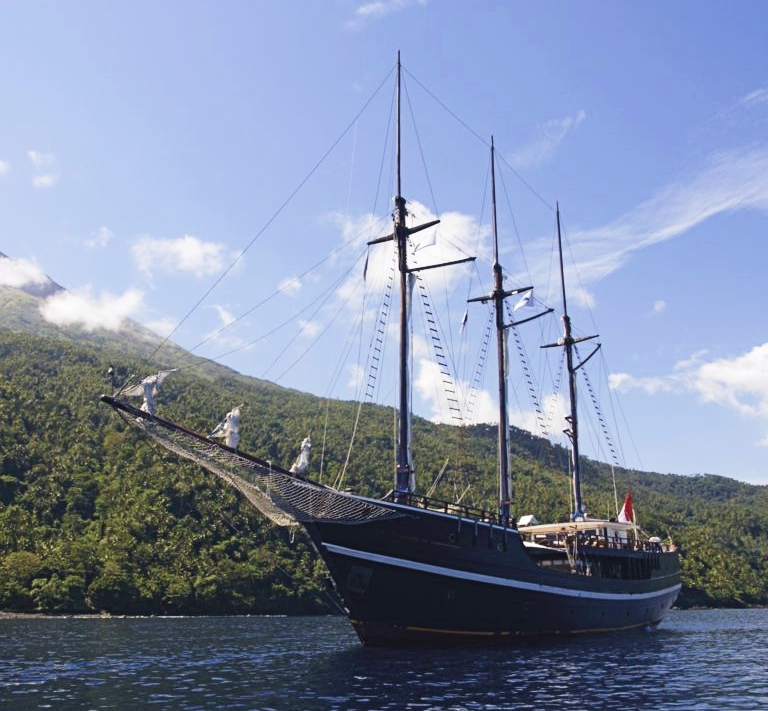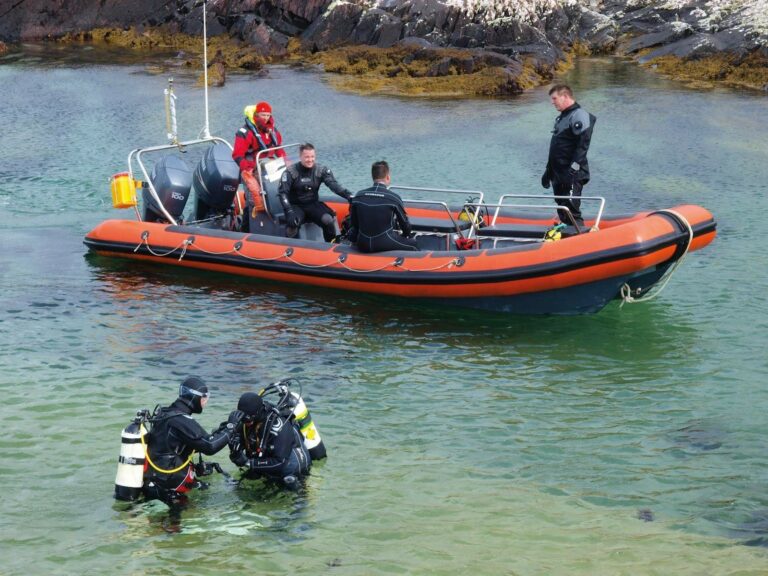MARTIN SAMPSON considers the importance of choosing a good skipper, whether you’re planning to go diving from a RIB, a hardboat or a liveaboard
”I’m not sure which was more exciting, the dive or the ride out in the boat!” commented one of my students. She was new to boat diving but, even so, after all these years I had to agree with her.
I am seldom happier than when there is a deck gently rolling beneath my feet and our ever-more-crowded lands are on the distant horizon. For true adrenaline junkies, a wave-bashing ride in a RIB is just as exciting – in a cold, wet, salt-in-your-face sort of way.
Selecting the skipper
The key to successful boat diving is a knowledgeable and experienced skipper. Naturally, a boat that is safe and up to the job is vital too.
Having experienced a RIB that kept trying to sink by the stern (it had been ‘modified’ to accept a different outboard engine), and also a perfectly good liveaboard yacht skippered by a confident incompetent (he ran us aground on day one – and again on day four), I can testify to the fact that boat and skipper are a complete package.
My first piece of advice would be to accept that a good dive charter operation costs good money because the overhead costs can be considerable if the boat is to be safe and reliable.
Many countries require boats to be licensed, and the UK is no different. All vessels that carry fee-paying passengers have to be licensed, and Maritime Coastguard Agency (MCA) licences are granted only after a rigorous survey of the boat and qualifications of the skipper.
Surveys are a regular event and, when you add in insurance, repairs and replacements, plus of course the spiralling costs of fuel, you can see that even a modest-sized RIB costs a lot of money to keep shipshape.
For that reason most skippers charge a non-refundable deposit and, with liveaboard vessels, it will be full fees upfront. This is no different to any other holiday that you would book, so it’s well worth considering taking out cancellation insurance.
What are you getting for your money? Dive charter-boats can be broadly considered as three types: RIBs, hardboats – dayboats – and liveaboards.
RIBS & hardboats
RIBs usually have only minimal shelter on board, so are particularly suited to ‘shuttle’ diving; short trips out to dive-sites and back to shore for a comfort break and air-fill.
Hardboats are often slower but have greater range and a better range of facilities. Some of the charter-boats operating in the Red Sea have accommodation standards on a par with luxury hotels.
This is not always true in all parts of the world. While in Egypt the authorities are adopting European standards on competency, in the Canary Islands I have seen a ‘skipper’ diving with his group, leaving an empty, unattended RIB on the surface – a highly risky practice that has cost lives in the past.
However,usually a boat provides a safe mobile dive-platform that can take you to destinations that are otherwise unreachable. More than that, if you charter a liveaboard vessel it’s like having your own floating hotel following you everywhere.
Liveaboards
UK liveaboard boats are few and far between nowadays. They are typically smaller than their Red Sea counterparts, though don‘t let the cosiness put you off. The catering is often terrific and someone else will be taking care of air-fills, leaving you with lots of free time to indulge yourself in your sport or simply relax.
Of the thousands of dives in my logbooks, the expeditions that I have been on in UK waters using liveaboards have undoubtedly been the most rewarding. The UK is, of course, a very fickle place for weather, so the other benefit of using dive charter-boats is the local knowledge of the skipper.
This expertise often saves the day. On one trip, the weather forced us to abandon our plans of reaching St Kilda and, although disappointing, our skipper Mark Henrys of the Hjalmar Borge knew that we could instead get into the rarely dived and spectacular Loch Tilasavey, just north of Taransay in the Outer Hebrides.
It helps to have such a flexible approach to dive-planning. The more narrowly defined the objectives, the less tolerant you will be of changes to your itinerary.
Well in advance of the trip, do discuss Plan A and a potential Plan B with the skipper. Every skipper I have ever used has worked tirelessly to balance the desire for a great dive-trip with the diving conditions and the abilities of the group.

If you haven’t boast-dived before, you don’t need to be a vastly experienced diver to start. Just be upfront about your experience and capabilities.
I asked local skipper Aubrey Diggle of SBS Charters in Trearddur Bay about this: “I like calls from divers who have no boat-diving experience,” he said. “Calls from divers who want to do deep wrecks sometimes make me wonder if they can walk the walk as well as talk the talk.”
A frustration for some skippers are the divers who make a booking and then fail to turn up, especially when they have made their own assumptions about the weather from the comfort of their armchairs 200 miles away.
Get in contact with the skipper a day or so before the trip to confirm the arrangements. Skippers are as keen as you are to be able to get you into the water, and might well have access to a sheltered site or which you were previously unaware. Their knowledge could make your day.
Photographs by Mark Evans
Also on Divernet: Dive deeper: Navigating life on a liveaboard dive boat, Boat-diving: Top tips for your first trip, Dive Like A Pro: Hardboat diving, Dive Like A Pro: RIB diving

